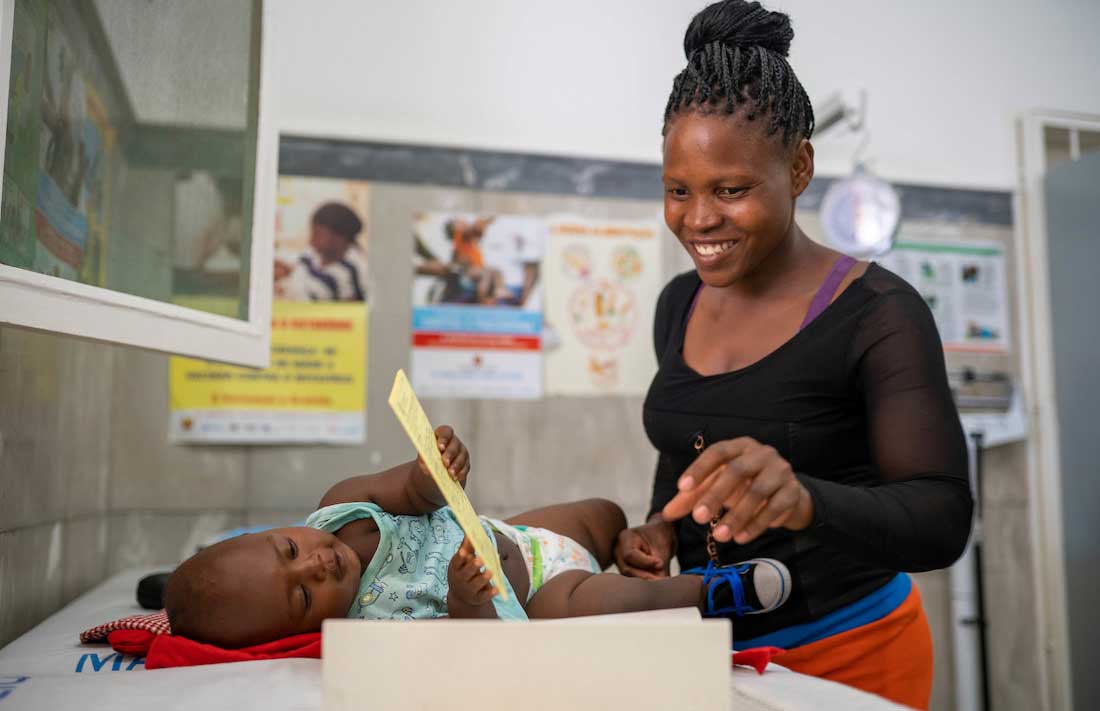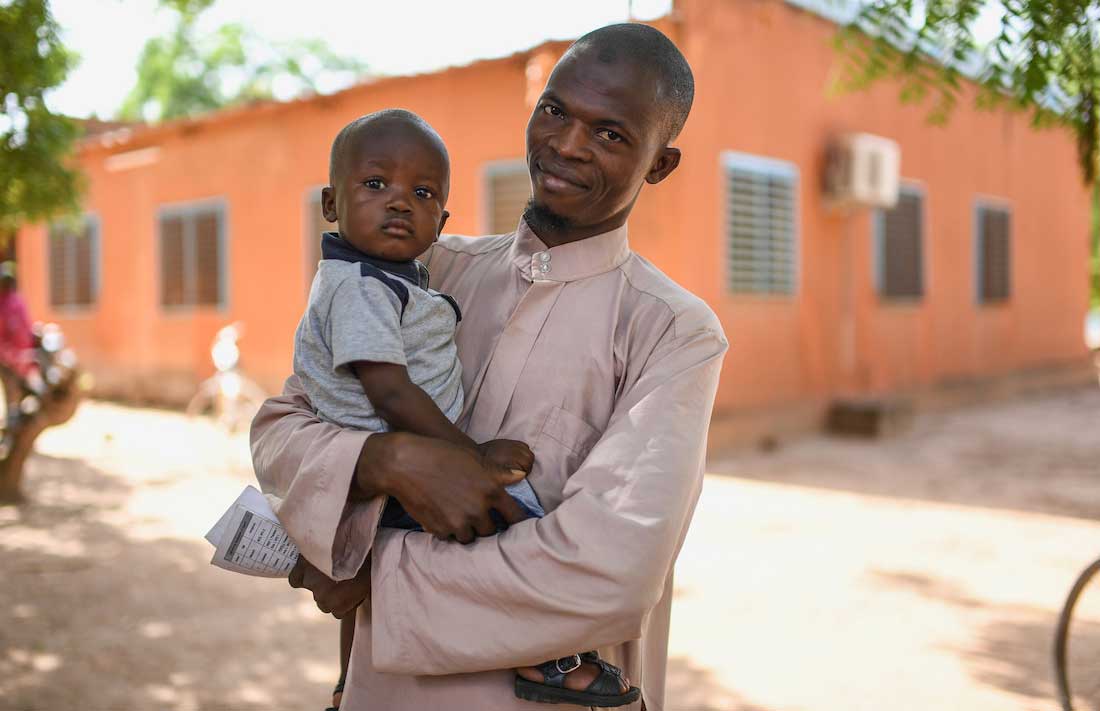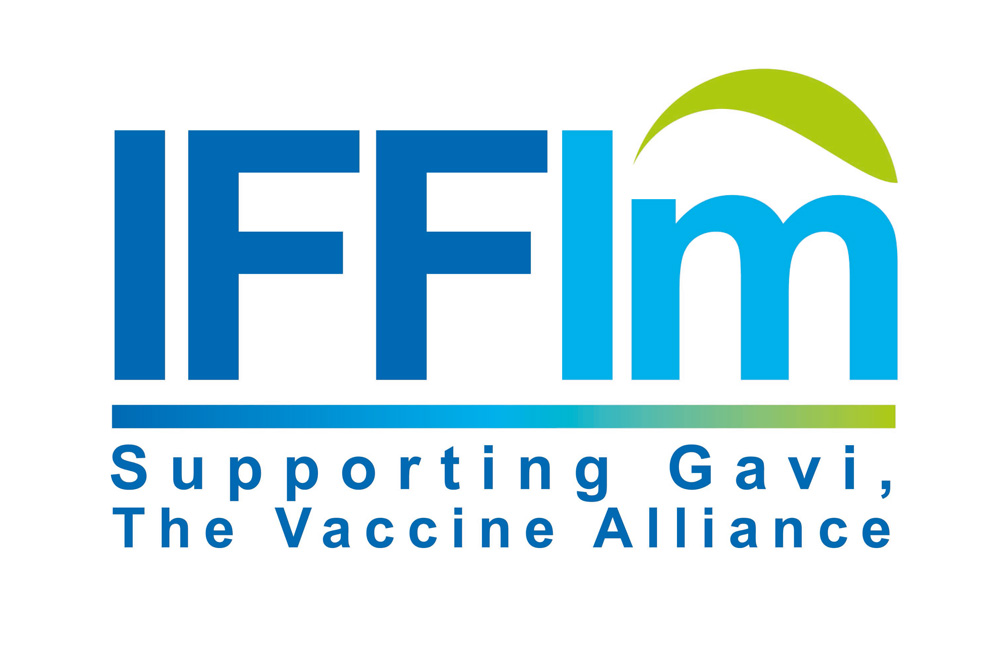IFFIm funding contributes to health gains across Africa
- Impact
- IFFIm funding contributes to health gains across Africa
IFFIm funding contributes to health gains across Africa
19 December 2022

Child holds vaccination card at Centro de Saúde do Alto Maé in Maputo, Mozambique. Credit: Gavi/2020/Svetlomir Slavchev.
IFFIm provides funding for 15% of Gavi’s immunisation programmes across Africa.
IFFIm’s strong commitment to health across Africa has been crucial to Gavi’s work. Between 2010 and 2021, about 40% of IFFIm’s total disbursements to Gavi was spent on immunisation programmes in Africa.
Announcements
IFFIm impact: zero-dose children
1 in 5 children in Africa have yet to receive a single vaccine. IFFIm supports Gavi's strategy to immunise these zero-dose children by providing nearly one-sixth of Gavi's overall programme support.
In two decades, Gavi has immunised more than 981 million children, and child mortality has been reduced by half. Nowhere has this work had a more profound impact than in Africa, where Gavi has invested 65% of its disbursements to reach 364 million children and averted more than 8.9 million future deaths on the continent.
Sub-Saharan Africa’s population is projected to double between 2022 and 2050, and demand for stronger health systems and access to vaccines are growing, too. IFFIm financing for Gavi programmes, from vaccine introductions to health system strengthening, will make a difference in vaccines delivered and lives saved.

IFFIm provides funding for 15% of Gavi’s immunisation programmes across Africa
IFFIm’s strong commitment to health across Africa has been crucial to Gavi’s work, providing more than US$ 1 billion* from IFFIm’s inception to 2021. Between 2010 and 2021, about 40% of IFFIm’s total disbursements to Gavi was spent on immunisation programmes in Africa.
IFFIm supports multiple initiatives in Africa, and major support for three Gavi programmes in particular has helped shape health outcomes. Gavi’s introduction of the pentavalent vaccine, which at US$ 1.4 billion is IFFIm’s largest-ever single programme disbursement, has protected millions of children. More than 25 million children received the third dose of pentavalent vaccine in Africa in 2020. In 2007, IFFIm support accelerated Gavi’s pentavalent programme by financing more than 90% of Gavi's promised payment to UNICEF to secure initial doses of pentavalent, a single shot which immunises against five infectious diseases: diphtheria, tetanus, pertussis, haemophilus influenzae type B (Hib) and hepatitis B. IFFIm’s upfront US$ 191 million investment in pentavalent encouraged manufacturers to increase production and decrease the price. In 2020, Gavi was able to procure pentavalent vaccines for US$ 0.86 per dose compared to US$ 2.98 in 2010.
IFFIm’s global support for the pneumococcal vaccine (US$ 600 million) and HSS (US$ 421.9 million), its second and third highest Gavi disbursements respectively, have also contributed to health and broader benefits across Africa. For example, health system strengthening facilitates the introduction of modern cold chain equipment to make sure that vaccines can safely reach everyone who needs them. This is critical in Africa where remote communities lack electricity and other means of safely storing vaccines.
Gavi report tracks impact on health across Africa
Gavi’s 2022 Africa impact report provides a snapshot of progress in African countries from 2000 to 2021.
- Gavi has helped introduce 9 vaccines into routine immunisation programmes in multiple African countries. These include vaccines supported by IFFIm: human papillomavirus (HPV), inactivated polio vaccine (IPV), measles, measles-rubella (MR), meningococcal A (MenA), pentavalent, pneumococcal, rotavirus and yellow fever (YF).
- Gavi has also reached 364 million children and averted more than 8.9 million future deaths on the continent.
- More than 25 million children received the third dose of pentavalent vaccine in Africa in 2020 alone (close to 40% of all children immunised with Gavi support globally in 2020).
- Including US$ 1.19 billion in support from IFFIm, Gavi has disbursed close to US$ 5.9 billion to African countries since 2000, representing 65% of Gavi’s total disbursements.
Gavi focuses on zero-dose children
With IFFIm support, Gavi is currently focused on the future with priorities that include reaching the unimmunised, pandemic preparedness and response and building capacity and infrastructure across the globe.
Reaching children who have yet to receive any vaccine is a priority. Gavi estimates there were still more than 7 million “zero-dose” children living in Africa as of 2020. To reach these children, Gavi’s current five-year strategy (2021 to 2025) is focused on reaching the most marginalised by strengthening health systems, building and sustaining community demand, addressing gender-related barriers and bringing innovative approaches to the table.
African countries, which are disproportionately affected by deaths due to infectious or parasitic diseases, also will be partners in Gavi’s efforts to prepare for emergencies and outbreaks, known as pandemic preparedness and response (PPR). IFFIm has proven its capability as a source of surge funding that can be called upon when needed. For example, in 2014, IFFIm provided standby funding to help Gavi mobilise resources to respond to a deadly outbreak of Ebola in the Democratic Republic of the Congo. More recently, IFFIm provided nearly US$ 1 billion to the COVAX AMC. So far, COVAX has distributed 1.84 billion COVID-19 vaccines worldwide. As a trusted, tested financing tool, IFFIm also has the potential to support Africa’s pandemic preparedness through contingent financing, a tool currently in development to help donors make advance pledges that would only be called upon in an emergency.
Despite progress, challenges remain
African countries still face formidable threats and funding gaps on multiple fronts, said Hassatou N’Sele, an IFFIm board member who is the Vice-President for Finance & Chief Financial Officer of the African Development Bank Group (AfDB). Progress in health across Africa has been hampered by the COVID-19 pandemic, and other longstanding challenges continue to delay further gains in some regions of the continent, she said.
“Climate change continues to lead to drought, extreme flooding, the displacement of people, and food and water insecurity. We have a huge infrastructure gap as well. There is no access to electricity for half of the population, which is affecting livelihoods and economic growth. Health is threatened, also.”
Vaccine inequity is exacerbated, as well, by a lack of vaccine manufacturing in Africa which only produces about 0.1% of the global supply of vaccines. Gavi is among the global health leaders advocating for increased production in Africa. More than 30 vaccine manufacturing initiatives are currently underway, and the African Union aims to produce and supply more than 60% of the doses required across Africa by 2040.

Getting routine immunisation back on track
Gavi and its country partners are prioritising increases in routine immunisation, which lagged during the pandemic, to prevent outbreaks of diseases like yellow fever, polio and measles. Countries demonstrating recent progress against these challenges, including Chad, Kenya and Ethiopia, have been able to engage their populations through networks of trusted health workers. They are key to building relationships with communities to ensure parents bring their children to be vaccinated.
“We have no reason not to bring our children for immunisation,” said Chinenye Adoke, a mother in Ebonyi State which ranks first in routine immunisation in Nigeria, Africa’s most populous country. “And, even when we don’t come, the vaccinators will come to the communities to vaccinate the children.”
*Figures are current as of 30 June 2022 unless otherwise noted.
Share this article
Restricted Access Library
 The material in this Restricted Access Library is intended to be accessed only by persons with residence within the territory of a Member State of the European Union and is not intended to be viewed by any other persons. The material in this Restricted Access Library is provided by IFFIm for information purposes only and the materials contained herein were accurate only as of their respective dates. Certain information in the materials contained herein is not intended to be, and is not, current. IFFIm accepts no obligation to update any material contained herein.
The material in this Restricted Access Library is intended to be accessed only by persons with residence within the territory of a Member State of the European Union and is not intended to be viewed by any other persons. The material in this Restricted Access Library is provided by IFFIm for information purposes only and the materials contained herein were accurate only as of their respective dates. Certain information in the materials contained herein is not intended to be, and is not, current. IFFIm accepts no obligation to update any material contained herein.
Persons with residence outside the territory of a Member State of the European Union who have access to or consult any materials posted in this Restricted Access Library should refrain from any action in respect of the securities referred to in such materials and are otherwise required to comply with all applicable laws and regulations in their country of residence.
By clicking Access restricted content: DYNAMIC-LINK-TEXT I confirm that I have read and understood the foregoing and agree that I will be bound by the restrictions and conditions set forth on this page.
The materials in this Restricted Access Library are for distribution only to persons who are not a "retail client" within the meaning of section 761G of the Corporations Act 2001 of Australia and are also sophisticated investors, professional investors or other investors in respect of whom disclosure is not required under Part 6D.2 of the Corporations Act 2001 of Australia and, in all cases, in such circumstances as may be permitted by applicable law in any jurisdiction in which an investor may be located.
The materials in this Restricted Access Library and any documents linked from it are not for access or distribution in any jurisdiction where such access or distribution would be illegal. All of the securities referred to in this Restricted Access Library and in the linked documents have been sold and delivered. The information contained herein and therein does not constitute an offer for sale in the United States or in any other country. The securities described herein and therein have not been, and will not be, registered under the U.S. Securities Act of 1933, as amended (the "Securities Act"), and may not be offered or sold in the United States except pursuant to an exemption from, or in a transaction not subject to, the registration requirements of the Securities Act and in compliance with any applicable state securities laws.
Each person accessing the Restricted Access Library confirms that they are a person who is entitled to do so under all applicable laws, regulations and directives in all applicable jurisdictions. Neither IFFIm nor any of their directors, employees, agents or advisers accepts any liability whatsoever for any loss (including, without limitation, any liability arising from any fault or negligence on the part of IFFIm or its respective directors, employees, agents or advisers) arising from access to Restricted Access Library by any person not entitled to do so.
"Relief" for mothers in Bayelsa state as malaria vaccine makes waves
07 November 2025
